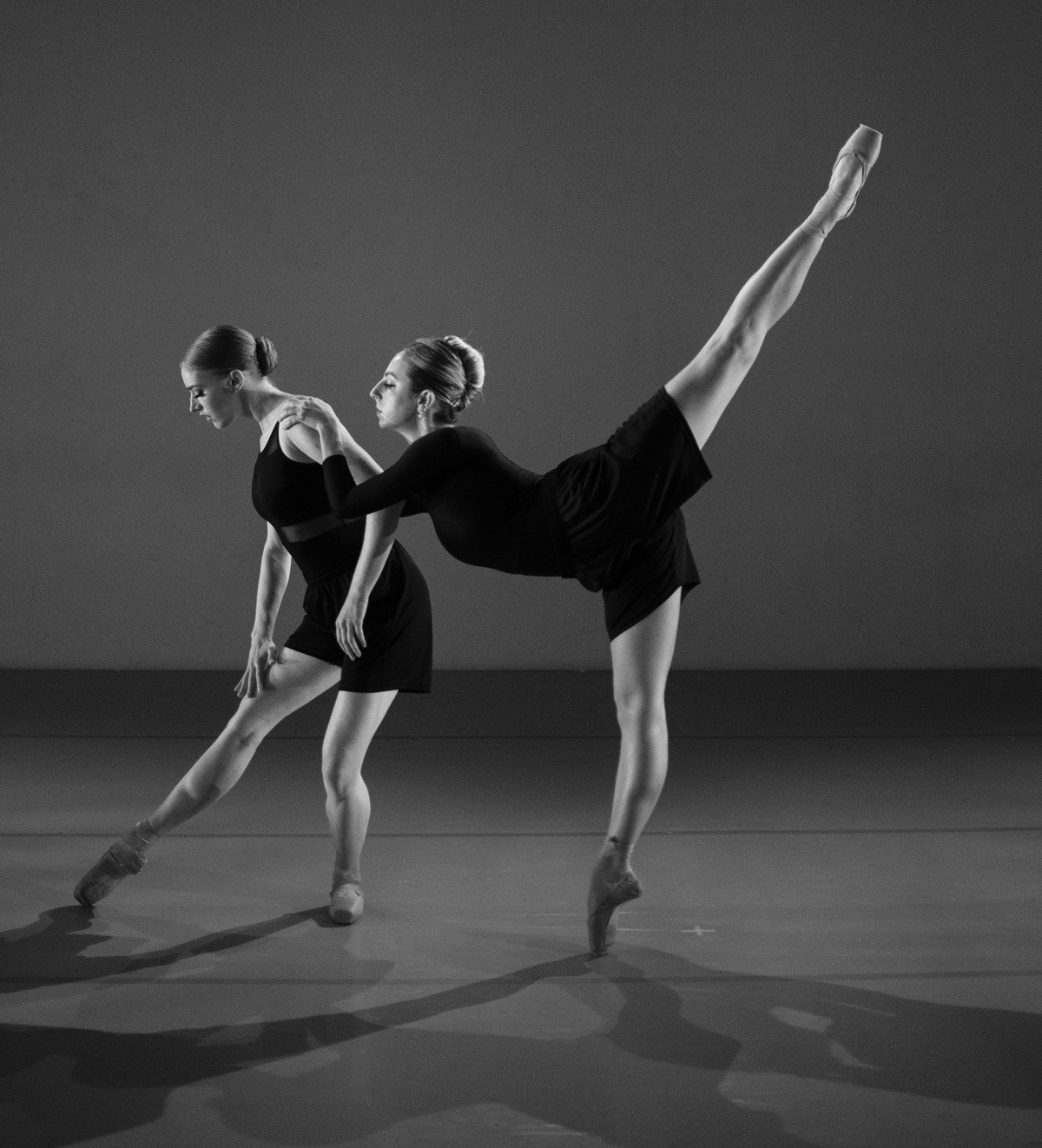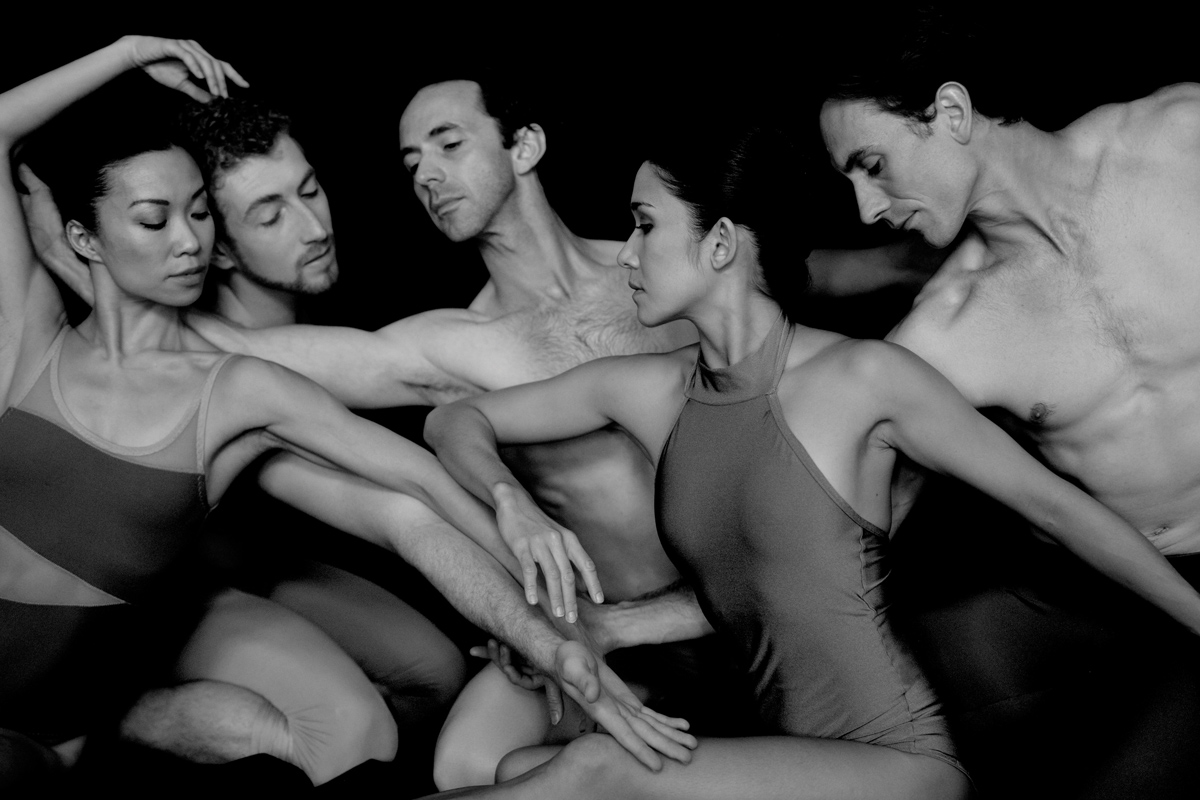Photograph by Joesph Guay
The Vertical, final production of Terminus Modern Ballet Theatre’s 2017–18 debut season, represented the steep challenges its five founders faced after they left Atlanta Ballet to form their own company.
Throughout the previous year, the high-profile dancers had raised money, built out a studio in West Midtown and rehearsed several world premieres. Now they were in the middle of a field at Serenbe, building an outdoor stage amid a subtropical storm.
Dark clouds rolled in, recalls company director John Welker. The artists covered the platform with a tarp, took shelter from the torrential rains and watched as frogs jumped and swam in puddles on the stage.
“We thought, this is crazy,” Welker says. But none of the artists considered canceling the show. Too much was at stake.
What later unfolded felt like a miracle—choreographer Tara Lee’s soulful tale of a Southern Appalachian community whose members moved through phases of life that ranged from love and death to responsibility, searching and celebration.
The Vertical showcased its founders’ allure—from Lee’s and Welker’s nuanced dramatic power to Heath Gill’s comedic brilliance to the breathlessly spontaneous partnering of Rachel Van Buskirk and Christian Clark. Even in its first season, Terminus was clearly one of Atlanta’s elite dance companies.
This season, Terminus will look different on stage. Four of its five founders have transitioned into off-stage careers. Gill left last year to become Orlando Ballet’s rehearsal director. Van Buskirk, who recently became a mother, will relocate with her husband to Houston after a farewell performance in the White Box Theatre September 22.

Photograph by Christina J. Massad
New dancers have replaced them, and some wonder how smoothly Terminus will bridge into its next phase. Welker plans to keep the company’s heart beating with the same intensity its founders had in its early days.
“One thing that we hold true and dear in all of this transition is that the dancer is at the center of what we do,” says Welker. “It gives it a certain creative power that is the true engine of this organization.”
Before Welker co-founded Terminus, he was best-known as a leading performer at Atlanta Ballet. He also led behind the scenes. At 18, when he was new to the company, Welker became one of Atlanta Ballet’s union reps. With his wife, Christine Welker, he ran the company’s summer ballet program and later founded Wabi Sabi, Atlanta Ballet’s off-season troupe that performed in outdoor spaces before the company shuttered it in 2017. Welker completed a college degree during that season. His senior thesis, and entrée to earning an MBA, was Terminus’ business plan.
Welker and his colleagues drew inspiration from their mentor John McFall, Atlanta Ballet’s artistic director until forced to depart in 2016. After that break, the five “Terminators” set out to discover their collective artistic voice, and within a culture of shared creativity, to tell stories through dance that had contemporary relevance.
Terminus and its school now occupy a 7,800–square foot headquarters at Buckhead’s TULA Arts Center with ample studio space and the company’s White Box Theatre. The organization that started with $55,000 in seed money now has an annual operating budget of $1 million.
Roles have shifted among the three remaining founders. What started as a “collective leader mindset,” Welker says, has changed.
Welker now helms Terminus and Lee serves as rehearsal director. Clark, as senior dancer, leads a group of 10 dancers that includes company members, protégés and resident guest artists.
Welker says that as the organization evolves, its “collective and creative culture” will remain. Dancers are invited to contribute their ideas and talents to every facet of the organization—from collaborating on creations to production, marketing and teaching. They’re invested in the life of the organization and have a significant stake in its success.
“Part of the journey in becoming an artist is discovering who you are,” says Welker. “And it’s important that an artist has a sense of self-empowerment and feels that they have a voice that is contributing and matters.”
Lee takes a similar approach to guiding younger dancers. “It’s not about coaching them to be who we are,” says Lee. “It’s about seeing what their path is and who they’re supposed to grow and evolve into. It’s going to be different colors, different energy.”
Lee, whose works helped define the company’s brand, has stepped away from choreographing so she can care for her aging parents during off hours. She sees this as an opportunity for mostly younger choreographers on the international scene who share Terminus’ passion for collaborative dance-making.

Photograph by Joesph Guay
Four such artists will present world premieres this fall. September’s Out of the Box program will feature works by Jennifer Archibald and Shane Urton. Archibald, the former resident choreographer at Cincinnati Ballet, has teamed with filmmaker Felipe Barral to delve into the subject of caring for the land we occupy, while considering future generations who’ll use it.
Urton, a member of the Royal Ballet of Flanders, will debut a piece that explores the temporary nature of life and how people shed layers of personae in order to adapt and evolve. This production will open September 14 and will run Saturdays and Sundays in Terminus’ White Box Theatre through September 22.
Gill will return for KRYPTOS, Terminus’ late fall production at the Pavilion at Serenbe. He’s creating a ghost story and re-telling of the 19th–century ballet Giselle. Choreographer Jimmy Orrante will debut a new ballet. The double bill will run for three weekends starting October 18.
New choreographic voices, and an approach that values every individual’s contributions is essential to empower Terminus’ next generation to help define the company’s evolving identity.
Meanwhile, Welker continues to aim high. He’d like to double the budget in three years and expand the company, staff and school. “It’s a big goal,” Welker says, “but that’s the ambition that we were founded on, and we need to keep that drive alive.”
A version of this article appears in our September 2024 issue.
Advertisement


